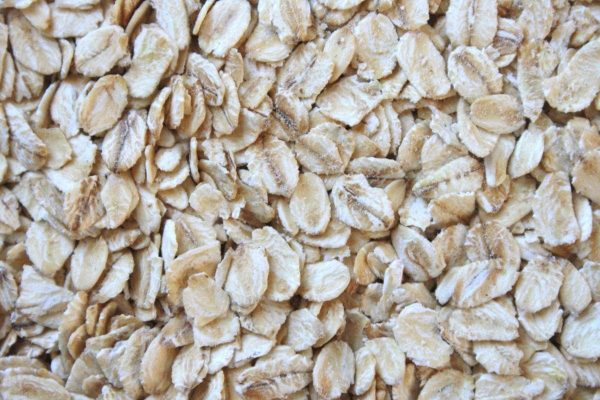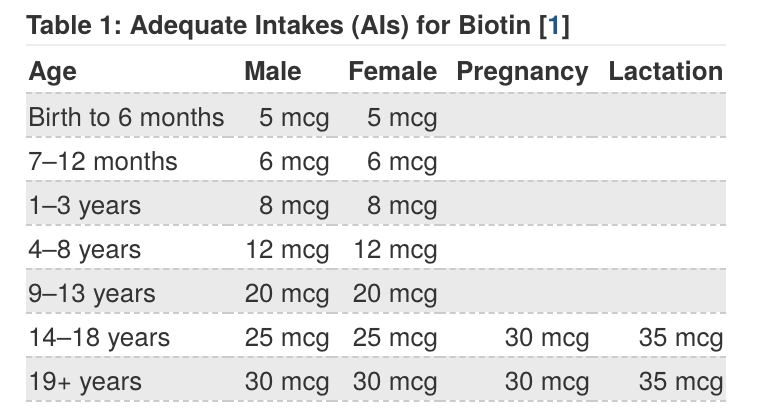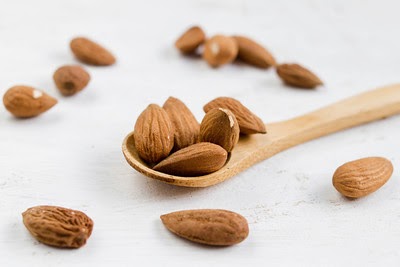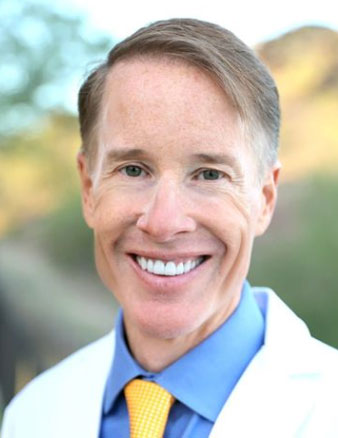Biotin is an important nutrient that you should be aware of, but there’s also a lot of misinformation out there about it. Today, I want to help separate the facts from the fiction about biotin, and what it means for your thyroid, your hair, and your overall health.
Recommended Product: Every day should be a good hair day. Am I right? Hair loss might be the worst aspect of thyroid symptoms. Good news, we’ve got you covered. I have pinpointed key nutrients that can help support the body to regrow hair along will all your essential thyroid nutrients included in this Thyroid Hair Regrowth Bundle.
A Primer On Biotin
Did you know that biotin was the last-discovered B vitamin that we found? We found it because it showed up when people were consuming lots of raw eggs. Otherwise, it is hard to be overtly-deficient in biotin.
Consuming lots of raw eggs became a fairly common practice during what was termed the “physical culture” which matured in the 40s, 50s, and 60s. Remember the scene in the movie Rocky, where Sylvester Stallone famously drinks a bunch of raw eggs like a smoothie?
What happens is that egg yolks, which are a very rich and nutritional source of biotin, have an enzyme in them that actively destroys biotin.
Now, this enzyme is otherwise fragile when you heat it. That said, if you consume them raw, you can end up with a biotin deficiency (even with the strength of the yolks).
Bottom Line: During this time, people had fairly significant hair loss, as well as dermatitis which was related back to biotin.

How Much Biotin Do We Need?
Here’s the good news: it is pretty straightforward and simple to get the amount of biotin that we need in a day.
But, it is also possible for us to fall behind in biotin. In fact, you can eat all the right foods and still be lacking.
So, it takes a mix of both awareness and action to make sure you are hitting your required intake for the day.
Here’s a helpful chart that illustrates the daily requirements of biotin…1

All it takes is just a few micrograms of biotin, but for adults it takes somewhere around 30 and above. This is done truly to offset the problems that may arise from deficiency.
That is also taking into account the fact that many people have different and varying needs. Some need higher and some need lower amounts.
So, when it comes to allowances, you shouldn’t be concerned about “overdosing” on biotin in your diet.
Instead, it is about having the wiggle room you need for when you have biochemical differences (meaning that some people have different needs than others at their core).
Key Insight: 30 micrograms of biotin is going to meet the needs for most adults. For children and nursing women, though, these needs may range a bit higher to meet their unique needs.
Biotin In Foods

So, where can we get the most biotin in our diets? In compiling this list, I was personally surprised to see that even when you eat a variety of healthy foods, you could find yourself low in biotin.
While it is in many foods, the highest food sources might be 17-20 micrograms. In this sense, your highest practical food source would be oats.
Rolled oats, steel-cut oats, whole oats, all of them. I’m personally a huge fan of oats, so the more you can work them into your diet, the better!
Key Insight: From there, you could end up with around 20 micrograms of biotin per serving.
Wheat germ is also rather high in biotin, but a practical serving size might not be enough on its own. You would need to get a little more to meet your daily needs.
Here’s the full breakdown for your consideration:
- Almonds – 1 ounce – 15 mcg
- Sweet potato – 100 grams – 10 mcg
- Eggs – 2 – 9 mcg
- Onion – 1 cup – 9 mcg
- Oats – 1/2 cup rolled – 20 mcg
- Wheat germ – 100 grams – 17 mcg
- Mushrooms – 10 grams 16 mcg
- Brown rice – 100 grams – 12 mcg
- Tomato – 1 medium – 8 mcg
- Carrots – 1 cup – 8 mcg
- Walnuts – 1 ounce – 7 mcg
- Salmon – 3 ounces – 6 mcg
Bottom Line: When it comes to biotin, consistency in your diet is key. This is especially true if you are excluding things from your diet, or are making changes week-to-week or day-to-day. It will help to be mindful of the gap, so you can close it with the above listed foods.
It’s also worth noting that alcohol does deplete biotin in the body. There is a strong relationship between each regular serving of alcohol, and one’s rates of being low in biotin.
So, if you have a regular alcohol intake, this is certainly something deserving your attention.
How Would You Know If You Were Deficient?
There are serum tests out there which do show your biotin status.
We do see that, from serum markets, about a third of all pregnant women are perhaps low in biotin.
They are less at risk, overall, when they are taking an appropriate multi-vitamin, that which would contain biotin (Read More: How To Test Your Thyroid, Too).
There was also a study I ran into that saw, looking at those who experienced hair loss, that of this sub-population there was between 30-40% that were low in biotin.
Before seeing studies like these, I was under the impression that these deficiencies were much more unusual and much more rare. But, after making my way through the diet, their occurrences may be far more common than previously thought.
While serum tests are available, it is generally advisable to avoid biotin for 73 hours beforehand (so that you’re getting accurate results).
In terms of markers, here’s what you need to know:
- <200 ng/l are considered deficient
- 200 – 400 ng/l suboptimal
- >400 ng/l optimal
Bottom Line: If you are experiencing any of the symptoms I illustrated beforehand, or you have a diet that you know is low in biotin, it may be worthwhile to get tested to get a proper read on your current biotin levels.
What About Thyroid Disease?
There has been a lot of discussion surrounding biotin and thyroid disease. More specifically, high doses of biotin may ultimately slow down the thyroid.
It turns out that this is an artifact of how biotin reacts in a laboratory setting.
In the past, we thought that doses above 10,000 or 5,000 micrograms could cause hypothyroidism for some people.
Then, we realized that it doesn’t cause thyroid disease so much as it skews TSH levels in the body. That said, now we know that it will also affect:
- Ferritin
- T4
- Vitamin D
- TSH
Key Insight: Pretty much any supplemental dose of biotin can do that. And, while it is certainly not changing your body, it is simply skewing how they are read in the laboratory.
This really just emphasizes the fact that you need to avoid any and all supplemental biotin for 73 hours before getting tested. Not 72 hours, which would be three days, but specifically 73 hours.
For those on the Daily Reset Pack, this would mean taking your last dose on Friday morning in order to get tested on Monday morning.
Action Steps: Biotin
So, what should we do about biotin? Now that we know it’s not a cause of hypothyroidism, and that avoiding a deficiency is important, here’s what you can do moving forward.
The first is to start consuming a variety of biotin-rich foods. Try at least a serving or two of the most biotin-rich foods, such as oats, every day.
Key Insight: It is reasonable to include up to 30 micrograms of biotin for daily supplementation, so please make sure that you are supplementing with a multi you can trust.
If hair loss is an issue for you, consider screening for a biotin deficiency along with other causes. This is based on what we mentioned earlier, that around 28% of women with hair loss may be low in biotin.2
Again, try and avoid raw egg whites whenever possible. While it might be tempting to try your best Rocky impression, it’s really not advisable.
Lastly, make sure to avoid all supplements with biotin for exactly 73 hours before taking blood tests. This is essential to get a proper read on your results.3

Test Your Thyroid Today
Now that we know a bit more about biotin, how is your thyroid feeling?
If you’re concerned about its functioning, and what you can do to safeguard its health for the long-term, I would highly recommend the Thyroid Quiz (Click Here: Take The Quiz) Today.
It can help separate the facts from fiction, while outlining clear actions to help your thyroid and make sure you are feeling your best today, tomorrow, and into the future.
Resources
1 – https://ods.od.nih.gov/factsheets/Biotin-HealthProfessional/
2 – https://www.ncbi.nlm.nih.gov/pmc/articles/PMC4989391/
3 – https://www.aacc.org/publications/cln/articles/2018/janfeb/meeting-the-biotin-challenge

1. Schedule a Thyroid Second Opinion with me, Dr. C, Click Here for Details
2. Download and use my Favorite Recipes Cookbook Here
3. Check out my podcast Medical Myths, Legends, and Fairytales Here
Dr. Alan Glen Christianson (Dr. C) is a Naturopathic Endocrinologist and the author of The NY Times bestselling Adrenal Reset Diet, The Metabolism Reset Diet and The Thyroid Reset Diet.
Dr. C’s gift for figuring out what really works has helped hundreds of thousands of people reverse thyroid disease, lose weight, diabetes, and regain energy. Learn more about the surprising story that started his quest.


